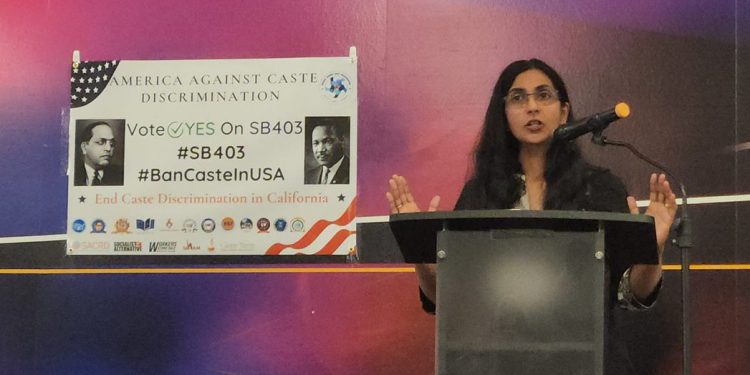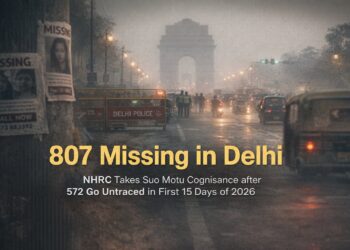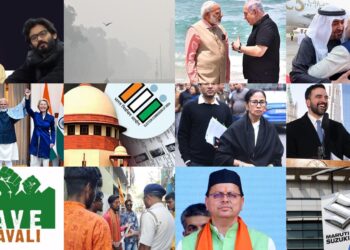A broad-based coalition of Indian-Americans cutting across caste, class, and religious lines launched a campaign in support of SB403, the California bill that aims to add caste as a protected category to the Unruh Civil Rights Act. Speakers at the launch included Councilwoman Kshama Sawant, who led a similar bill to victory in the Seattle City Council; Dr Roja Suganthy-Singh, President of Dalit Solidarity Forum, the oldest Dalit rights organization in the US; and Prof. Veena Dubal of the University of California College of Law, San Francisco.
The coalition, America Against Caste Discrimination (AACD), is led by community groups of the caste-oppressed, with thousands of caste-oppressed Americans as members. These groups are joined by Hindu, Muslim, Sikh, Christian, and Left-Secular Indian-American organizations. Together, they represent a variety of political traditions, including rich anti-caste traditions from South, North, and West India, and Indian-Americans as well as immigrants.
Asserting that caste discrimination is rampant in the United States, speakers, community members, and those harmed by caste discrimination present at the event rejected attempts by opponents of the bill to downplay the prevalence of caste discrimination. Speakers also attacked California assembly members Evan Low and Alex Lee for attempting to delay the bill by calling for more research, and for trying to reduce caste to discrimination on the basis of ancestry.
In a June 20 letter, Low and Lee called for official research into the prevalence of the problem. They also suggested amendments relegating caste to an additional component under the existing protected category of “ancestry.”
“The voices of Californians harmed by caste discrimination cannot be ignored, and it is reprehensible that opponents of the bill are seeking to dismiss our voices and our pain. Assemblymembers Low and Lee must realize that they are enabling the continuance of this harm, and acting in defense of one of the cruelest and most prevalent forms of injustice in existence today,” said Ram Kumar, President of Ambedkar International Center.
Raju Rajagopal from Hindus for Human Rights expressed the organization’s commitment to working with all the members of AACD in securing a legal foundation to ending caste discrimination in California, and elsewhere in America. He said, “We are proud to add a progressive Hindu voice to the call to annihilate caste, even as we acknowledge the role of our dominant caste forebears in architecting and practicing the monstrous system of caste hierarchy and deep-seated bigotry against fellow human beings.”
“Democrats in the California Legislature are shamefully bending to pressures from the Hindu right wing, and attempting to weaken, indefinitely stall, and even eliminate SB403. This is the bill that would, if passed, follow Seattle’s February victory and ban caste-based discrimination statewide. This shows the need for caste-oppressed community members, working people, and union members to urgently fight back.”
Kshama Sawant, Seattle City Councilmember
On attempts to subclassify caste under discrimination on the basis of ancestry, a spokesperson from India Civil Watch International said, “Caste is a complex form of discrimination that combines prejudices on the basis of religion, color, and race in addition to ancestry, and involves a broad spectrum of gender-based harms. To pretend that such a complex problem can be reduced to the category of ancestry alone is a lie that assembly members Low and Lee must stop telling themselves and their colleagues.”
Kshama Sawant, Seattle City Councilmember, commented, “Democrats in the California Legislature are shamefully bending to pressures from the Hindu right wing, and attempting to weaken, indefinitely stall, and even eliminate SB403. This is the bill that would, if passed, follow Seattle’s February victory and ban caste-based discrimination statewide. This shows the need for caste-oppressed community members, working people, and union members to urgently fight back.”
Prof. Veena Dubal reminded us of the long history of attempts to erase caste, saying, “In 2005, the Hindu Right campaigned to erase mention of caste from California textbooks. At that time, they made the argument that the inclusion of caste hurt their kids’ feelings because it made them feel shame. Back then, I stood up at one such public meeting and said, ‘It is shameful. It is really, really shameful. And if we don’t teach about how shameful this is, then we have no opportunity to fight its reiteration in the diasporic context. If a white student came up and said, “I don’t want any mention of slavery because it hurts my feelings and makes me feel bad,” then you would look at that person with disgust and disbelief.’ In making this analogy, I was prescient: what do we have in the U.S. today but efforts to ban books, to ban knowledge about slavery? If we were to analogize opponents of SB403 with the Trumpian far right, we would not be wrong.”
Dr Roja Suganthy-Singh, President of Dalit Solidarity Forum said, “AACD as a coalition of various rights-based Indian-American organizations in the USA is the vanguard of civil rights dissemination in the United States as we condemn and contend caste-based discrimination from a legal, economic, political and social standpoint. In a democratic country such as the United States, the dominant agents of caste believers hold onto socially fabricated identities, while sitting atop globalization channels, national and international financial institutions, President Biden’s administration, technology companies, media, schools, colleges, Universities, and STEM fields.” She added, “As a coalition, we fight against this caste-based structural mechanism that is normalized in India, but we will not allow that normalization in the USA.”
Prasanna Gajbhiye of Ambedkar King Study Circle said, “AACD is thrilled to announce the launch event, bringing together progressive organizations to combat caste discrimination in the United States. By having this coalition we ensure that a diverse and representative viewpoint is put forth and at the same time counter the delay, dilution, and gatekeeping tactics used by assembly members, right wing Hindutva forces, and advocacy groups, thereby enabling a comprehensive approach toward achieving justice.”











